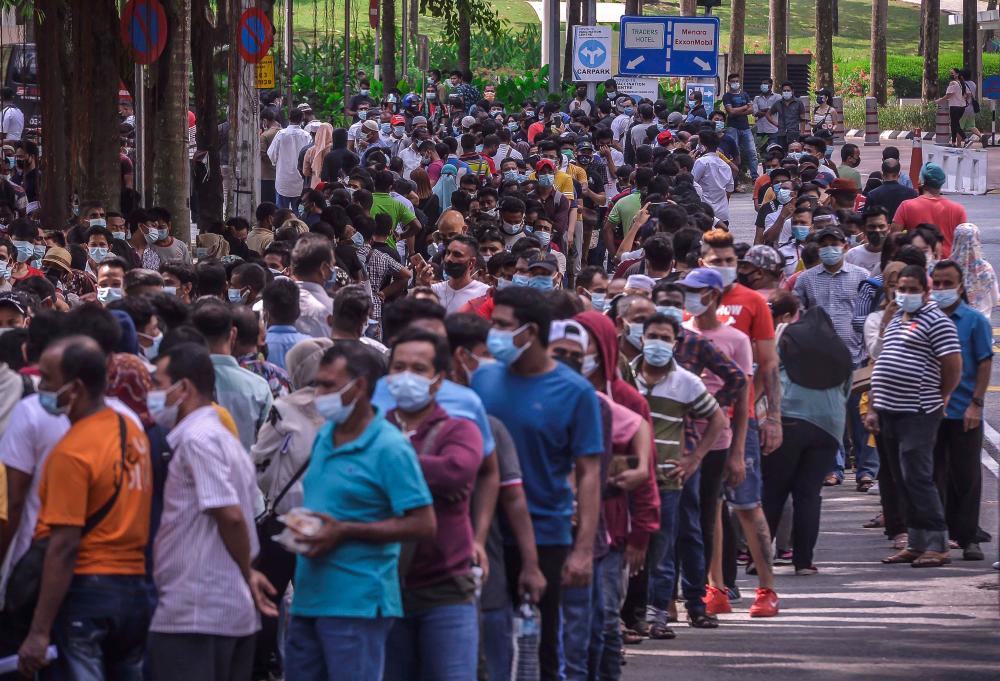PETALING JAYA: The process of getting migrant workers vaccinated against Covid-19 is a minefield in itself.
While there actually exists a provision under the law to make vaccination mandatory, it also violates guarantees of personal freedom.
Meanwhile, law enforcers continue to hound illegal migrant workers, instilling fear among them and driving them further away from any thought of getting vaccinated, with hopes of achieving herd immunity fading.
Failure to get more migrant workers to come forward for vaccination has raised a lot of concern, with several health experts warning that Malaysia will not achieve herd immunity if a large number of these workers remain unvaccinated.
Lawyer Shannon Rajan told theSun that “theoretically”, the government is authorised to impose obligatory vaccination.
“Under Section 11(1) and Section 11(3)(a) of the Prevention and Control of Infectious Diseases Act 1988, the minister is authorised to mandate vaccination.
“However, this has not been done because of the concern that it would also infringe upon personal liberties,” said Shannon, who is joint head of the occupational health and safety practice division at legal firm Skrine and Co.
“In any case, no one should be compelled, regardless of their immigration status.”
Rajan said the government could collaborate with civil society organisations to send out the message that it is better to get inoculated by focusing on the risk associated with avoiding vaccination.
“The immunisation process should also be made easier for all, regardless of whether they are Malaysians or foreigners.”
He said it may also be possible for employers to introduce a policy that mandates vaccination if it is seen as a reasonable and necessary step to ensure safety and health, and to protect the welfare of employees.
“To determine if such a policy is reasonable, the employer should conduct a Covid-19 risk assessment to identify measures that are necessary to safeguard employees and other people, as well as the consequences of failing to take those steps,” Shannon said.
However, he reminded employers to be mindful that such a policy could be subject to legal challenge and to be prepared for it.
Lawyer Abang Iwawan, who specialises in the construction sector, said there has to be a change in mentality to help the country move forward and achieve herd immunity.
For a start, he said the #kitajagakita campaign should not be construed as an effort targeted only at Malaysians.
“That is retrogressive and counter-productive.”
Abang, who also chairs the Young Society of Construction Law Malaysia, observed that in addition to institutional marginalisation, migrant workers also face discrimination chiefly because of xenophobia among the public.
“Apart from that, is the debate among Malaysians on whether migrants, especially undocumented ones, are deserving of legal and health protection during such trying times,” he said.
He urged the government to unravel the issues on the ground to come up with a viable solution for a problem that is very much deeper than it seems.
“Otherwise, it’s just like slapping on a band-aid.”
Abang said Malaysia could have learned from the experience of Singapore when the island republic was accused by Western media of losing control and failing to protect its migrant workers.
“Rather than take appropriate steps to address the same problem in Malaysia, the government chose to be heavy-handed and started arresting and detaining migrants.
“The impression that it would help curb the pandemic could not have been further from the truth,” he added.
Abang said the government should consider a moratorium on enforcement action against undocumented migrants and refugees to encourage them to come forward for vaccination.













